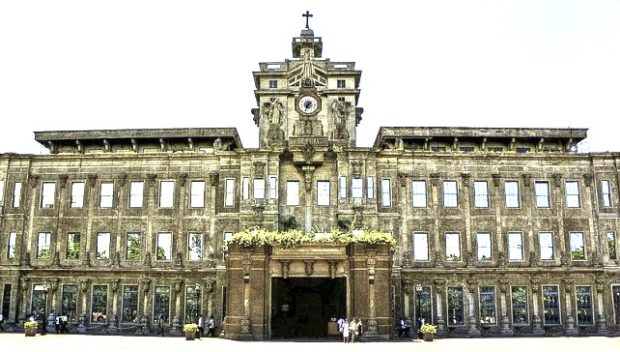Can PH Catholic education be saved?

Senior high school students of a Catholic collegefailed to enumerate the Ten Commandments, so did the MBA students of Ateneo and DLSU, when I asked them. Half of them also responded that same sex marriage is okay, provided there’s real love between the couple. Huh, the FreeToLove ads of Close-Up?
In the Philippines, “parishes are often seen as sacramental filling stations, where people come for the Eucharist, baptisms, marriages and funerals, but little else,” assessed Catholic journalist John L. Allen Jr.
Socio-cultural activist and tour guide Carlos Celdran had a confession: “If a plane is crashing and I’m in it,” he said, “I’ll pray the Hail Mary.” “Raised a Catholic, absolutely,” he added, “if I pass by a church, I will genuflect and pray the cross.”
But Celdran decided to disrupt a religious service at Manila Cathedral in 2010 by holding up a sign with the words “Damaso,” alluding to a Spanish friar priest in Rizal’s novel Noli Me Tangere.
Ex-Catholic president
Young Duterte’s mother made sure he got a Catholic education, finished his secondary schooling at the Holy Cross College in Digos (after 7 years), and completed his law degree at the Benedictine-managed San Beda College in Manila.
With her Catholic mother gone, Duterte blasted the country’s dominant Church as “the most hypocritical institution,” calling bishops and priests “sons of bitches” for criticizing his “murderous” war on drugs and his sponsorship of death penalty in Congress.
Ex-Catholic ex-Speaker
Pantaleon Alvarez out-and-out denied he was a Catholic but his marriage document says he is Catholic by religion. Well, in almost all official records, the huge majority of Filipino senators, congressmen, mayors and politicians have all claimed to be Roman Catholic by religion and by education.
Alvarez called for pro-death penalty Catholics to change religion, as he proposed the taxation of Catholic-run schools. BTW, Alvarez studied law and graduated from the Ateneo de Manila Law School in 1983.
Of course, there’s nothing new with Catholic-educated intellectual and national leaders becoming anticlerical and anti-Catholic, going all the way to speak out in public against the very priests and bishops (personally and collectively) who in a perfect sense educated them.
Hard-hitting triumvirate of the Propaganda Movement
Graciano López-Jaena (1856-1896) is one good example of a seminarian (he did not stay long at San Vicente Ferrer Seminary in Jaro, Iloilo) who became anticlerical. At 18, he wrote Fray Botod, which became the insulting caricature of the Spanish clergy, its original handwritten hardcopy circulating among his friends and neighbors.
Another Catholic-educated ilustrado who became anti-Catholic was Marcelo H. Del Pilar (Plaridel), who got his secondary diploma from Colegio de San Jose and met the legendary Father José Burgos. From Colegio de San Jose, Del Pilar enrolled at the University of Santo Tomás, where he finished his licentiate in law in 1880. In 1888, the Catholic-educated Plaridel wrote a profane parody of the prayer Our Father:
“Our stepfather, who art in the convento;Cursed by thy name;
Thy greed depart, thy windpipe be slit on earth as it is in heaven.
Return to us this day our daily bread;
And make us laugh with thy horse laugh, as you laugh when you fleece us.
And lead us not into temptation but deliver us from thy evil tongue. Amen.”
The writings of José Rizal, López-Jaena, and Plaridel were like liquid poop hitting a running industrial fan inside a tidy cathedral during High Mass. Theirs were sacrilegious; but did they somehow sent the Catholic hierarchy into deeper reflection, and taught our bishops and priests a lesson or two?
Alarm among Catholic educators sounded
Almost always, in Rizal’s time, the Filipino students in Spain, after finishing their advanced studies in Catholic institutions joined the Masonry or otherwise gave up the practice of the Catholic Faith.
The Spanish Jesuits in the Philippines were also vexed at the frequency with which many of the Ateneo graduates turned to Masonry. So were the Dominicans.
Today, the Philippine Congress is practically unrecognizable. With the supermajority of our lawmakers having received Catholic education, Congress has legalized and promoted the use of condoms and artificial contraception, with bills on divorce, death penalty and same-sex marriage pending or in the pipeline, all signs of the times pointing to breaking away from Sacred Tradition.
The Philippine Catholic Church, once marked by stability, is now marked by uncertainty and change. So, has Catholic education failed?
Jose Mario Bautista Maximiano (jomaximiano@gmail.com) is the author of The Signs of the Times and the Social Doctrine of the Church (Salesiana, 1992) and The Church Can Handle the Truth (Claretian, 2017).

